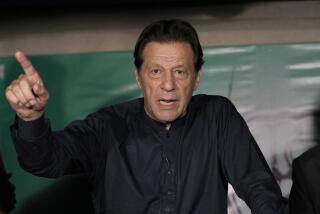Out of order
- Share via
It’s no surprise to see black-suited men in the streets of Karachi pelting a member of President Pervez Musharraf’s Cabinet with tomatoes, eggs and even a shoe. But it is disheartening when the men in black suits turn out to be lawyers who have spent the last year protesting the lack of rule of law in Pakistan, and when seven people are left dead.
By voting out Musharraf’s party in February, Pakistanis have set off a slow-moving political earthquake. Musharraf clings to the presidency but is in danger of impeachment. Parliament is stalemated by rival parties. And the judiciary has become the prize in a fierce power struggle between president and parliament.
The battle over control of the courts has been underway since Musharraf ousted the chief justice of the Supreme Court more than a year ago. Young lawyers have led a movement to reinstate Iftikhar Chaudhry and dozens of other justices dismissed by Musharraf -- and to build a judicial system that at last can claim independence and integrity. Musharraf retaliated with an edict that allowed police to arrest demonstrating lawyers on terrorism charges -- and placed the chief justice under house arrest.
For most of Pakistani history, the courts have been firmly under the thumb of the authoritarian executive. Then Chaudhry and some of his fellow judges began growing spines. They began convicting presidential cronies of corruption, asking after some of the estimated 4,000 Pakistanis who have disappeared in police custody, and finally appeared poised to nix Musharraf’s unconstitutional reelection scheme.
Now the democratically elected government has a plan to reinstate Chaudhry and the other judges. This will take time and require delicacy. As lawmakers are well aware, they must not only deal with the fired judges and those who have been hired to replace them, they must also deal with more fundamental questions about how a truly independent judiciary can be built amid the country’s political turmoil.
Will parliament demand confirmation hearings for judges, or will it attempt to control them by appointing them only for brief terms? Will it try to pack the Supreme Court with justices who will vote to impeach Musharraf? Or will it instead embark on the structural reforms needed to end the culture of impunity for the powerful? At stake is whether Pakistan can evolve at last into a nation where the rule of law applies to presidents, judges, police officers -- and even lawyers.
More to Read
Sign up for Essential California
The most important California stories and recommendations in your inbox every morning.
You may occasionally receive promotional content from the Los Angeles Times.










